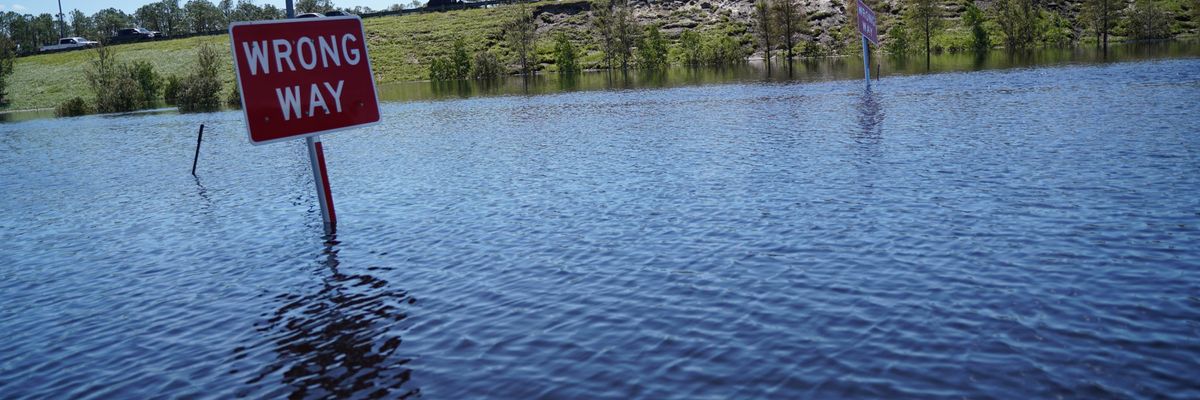With Puerto Rico and Florida still reeling from a pair of hurricanes--one of which made landfall again Friday as a Category 1 storm in South Carolina--activists across the United States have renewed calls for President Joe Biden to declare a climate emergency.
"President Biden, declare a climate emergency. If not now, when?"
"Is it time to declare a climate emergency yet?" NASA climate scientist Peter Kalmus--among the outspoken experts demanding more action from the U.S. government--tweeted Thursday.
As Jean Su at the Center for Biological Diversity explained earlier this year, "Declaring a climate emergency isn't a catchphrase, it's a vital suite of actions to protect people and the planet from this crisis."
Su co-authored a February report for her group detailing some of the steps Biden could take to speed up the transition away from planet-wrecking fossil fuels if he issued an emergency declaration.
Campaigners have since ramped up pressure on the president, including with an Indigenous-led blockade outside the U.S. Department of Interior as well as delivering a 16-foot inflatable globe and nearly half a million petition signatures to the White House in August.
Progressive organizer Kai Newkirk on Thursday shared photos of the damage that Hurricane Ian caused in Florida and said: "President Biden, declare a climate emergency. If not now, when?"
Highlighting that the climate crisis disproportionately affects people of color and low-income communities, CPD Action stressed in a series of Ian-related tweets that "this disaster only illustrates the urgency for decisive change for our climate and our economic survival."
"There's no time to waste," the group added, urging Biden "to declare a climate emergency so he can use the powers of the executive branch to address this life-threatening crisis."
The youth-led Sunrise Movement on Friday also called for declaring "a full, national climate emergency."
As Ian barreled toward Florida's west coast this week, National Wildlife Federation executive vice president Mustafa Santiago Ali wrote for The Guardian that "the climate crisis is here and levying steep costs on communities. Black, Indigenous, and other frontline communities, including those in my home state of West Virginia, are experiencing these impacts--measured in lives lost, homes destroyed, and livelihoods upended--first and worst."
Along with noting Ian's path, Ali pointed to Hurricane Fiona's recent impacts on Puerto Rico--on top of still dealing with the fallout from Irma and Maria in 2017--and "the remnants of Typhoon Merbok, which destroyed homes and inundated western Alaska with historic levels of water" earlier this month.
"We need to help these communities and others rebuild stronger and more resilient to climate-fueled storms," he wrote, calling on policymakers in Washington, D.C. to build on the Inflation Reduction Act (IRA) and the bipartisan infrastructure law to cut planet-heating emissions.
"President Biden should step into the breach and declare a climate emergency," Ali asserted. "Mother Nature is not waiting for the president or Congress to declare a climate emergency. She's showing us in real-time here in the United States--with wildfires, floods, heatwaves, hurricanes, and drought."
Ali detailed the climate crisis-fighting powers Biden could unlock with an emergency declaration, which he argued would also "set the tone heading into the COP27 gathering in Egypt," the United Nations climate summit planned for November.
"My grandmother used to say if you know better, do better," he concluded. The president gets it when it comes to the threat climate change poses to Black people and other frontline communities. He now needs to show Congress, the states, and the world what doing better looks like in practice. Our lives depend on it."
Ali echoed his demand in a Friday tweet that featured video footage of Ian's destruction.
University of Pennsylvania climate scientist Michael Mann and Susan Joy Hassol, director of the nonprofit Climate Communication, wrote about the recent storms in The Guardian on Friday.
"Fiona hit Puerto Rico as a powerful Category 4 storm, and hundreds of thousands of people there are still without power," they noted. "The storm barreled on into the open Atlantic, eventually making landfall in the maritime provinces to become Canada's strongest ever storm. Then came Ian, which feasted on a deep layer of very warm water in the Gulf of Mexico."
Pointing out that "Ian made landfall as one of the five most powerful hurricanes in recorded history to strike the U.S.," the experts emphasized that this storm is not "an anomaly or fluke," but rather "part of a larger pattern of stronger hurricanes, typhoons, and superstorms that have emerged as the oceans continue to set record levels of warmth."
"Many of the storms of the past five years--Harvey, Maria, Florence, Michael, Ida, and Ian--aren't natural disasters so much as human-made disasters, whose amplified ferocity is fueled by the continued burning of fossil fuels and the increase in heat-trapping carbon pollution, a planet-warming 'greenhouse gas,'' they added.
Mann and Hassol argued that while taking "steps to increase resilience and adapt to the changes that are inevitable" is important, "only mitigation--the dramatic reduction of heat-trapping pollution--can prevent things from getting worse."
"We've seen some progress on that front recently, both in the U.S. and globally," they continued, specifically mentioning the IRA while also warning that more must be done--a message they delivered just over a month before the November midterm election.
"We need more aggressive climate action to pass Congress. And that means we need politicians who are willing to support that action, rather than act as apologists for powerful fossil fuel interests," they wrote. "That's something for all Americans to think about as they go to the voting booths in a matter of weeks."

